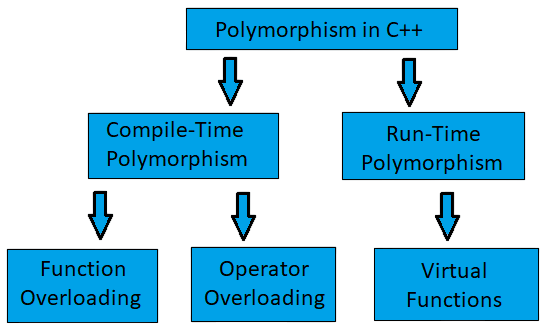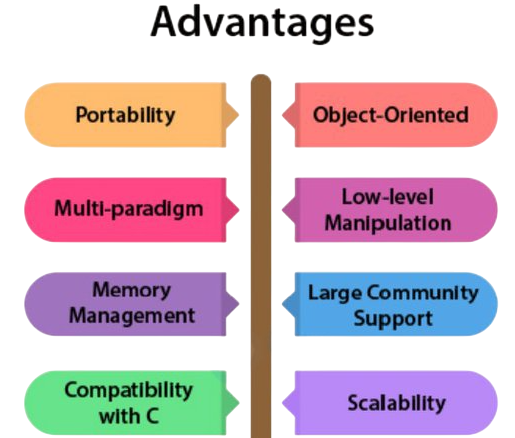
- Introduction to Polymorphism in C++
- Definition and Importance of Polymorphism
- Compile-Time vs Run-Time Polymorphism
- Function Overloading (Compile-Time)
- Operator Overloading in C++
- Virtual Functions and Run-Time Polymorphism
- Function Overriding and Late Binding
- Pure Virtual Functions and Abstract Classes
- Polymorphism with Pointers and References
- Advantages of Using Polymorphism
- Conclusion and Best Practices
Introduction to Polymorphism in C++
Polymorphism is one of the cornerstones of object-oriented programming (OOP), alongside encapsulation and inheritance. Derived from the Greek words “poly” (many) and “morph” (forms), polymorphism means “many forms.” In C++, polymorphism allows objects to be treated as instances of their parent class rather than their actual derived class. To complement object-oriented programming skills with front-end expertise, Web Developer Training can help developers create visually engaging interfaces that reflect modular and reusable design principles.

Understanding the Types of Polymorphism in C++ is essential, as it enables the same interface to be used for different underlying forms (data types), fostering code reusability and flexibility. C++ supports both compile-time and run-time polymorphism, and learning the Types of Polymorphism in C++ helps developers create scalable and maintainable software systems.
To Earn Your Web Developer Certification, Gain Insights From Leading Web Developer Experts And Advance Your Career With ACTE’s Web Developer Courses Today!
Definition and Importance of Polymorphism
Polymorphism in C++ is the ability of a function, operator, or object to behave differently based on the context. It allows functions to process objects differently depending on their data types or class inheritance. This behavior is central to Dynamic Method Dispatch in Java, which enables runtime decision-making by invoking overridden methods based on the actual object type rather than the reference type. This characteristic is vital in software engineering, where generality and abstraction are key. For instance, a single function interface can handle various types of input without changing the function’s logic. Polymorphism improves program organization, minimizes code duplication, and enables dynamic behavior, especially when combined with inheritance and pointers.
Compile-Time vs Run-Time Polymorphism
There are two main types of polymorphism in C++. To strengthen your understanding of naming conventions and object references across languages, exploring Must-Know Identifiers in Python can help clarify how variables, functions, and classes are defined and accessed in Python’s dynamic environment.
- Compile-Time Polymorphism: Also called static polymorphism, this is resolved during the compilation phase. Examples include function overloading and operator overloading. The compiler selects the appropriate function or operator based on the signature at compile time.
- Run-Time Polymorphism: Also known as dynamic polymorphism, this is determined during program execution. It uses virtual functions to allow behavior to vary depending on the object’s actual type at runtime, not its reference type. This is particularly useful when using pointers or references to base classes.
Each type plays a unique role in making applications both efficient and flexible.
Function Overloading (Compile-Time)
Function overloading allows multiple functions with the same name but different parameters to coexist in the same scope. The compiler distinguishes them based on the number and types of arguments passed. To understand how these behaviors integrate with inheritance and method resolution, exploring the Object Class in Java provides foundational insight into the root of Java’s class hierarchy and its role in polymorphic behavior.
Backtracking Logic for N-Queens Problem:
- #include <iostream>
- using namespace std;
- void print(int i) {
- cout << “Integer: ” << i << endl;
- }
- void print(double d) {
- cout << “Double: ” << d << endl;
- }
- void print(string s) {
- cout << “String: ” << s << endl;
- }
- int main() {
- print(10); // calls print(int)
- print(3.14); // calls print(double)
- print(“C++”); // calls print(string)
- }
Function overloading increases code readability and provides a unified interface for related operations. However, it’s limited to syntactical differences and doesn’t support behavioral variability, which is where run-time polymorphism comes in.
Would You Like to Know More About Web Developer? Sign Up For Our Web Developer Courses Now!
Operator Overloading in C++
Operator overloading allows custom implementations of operators for user-defined data types. This helps objects interact more intuitively, like built-in types.
- class Complex {
- int real, imag;
- public:
- Complex(int r = 0, int i = 0) : real(r), imag(i) {}
- Complex operator + (const Complex& obj) {
- return Complex(real + obj.real, imag + obj.imag);
- }
- void display() {
- cout << real << ” + ” << imag << “i” << endl;
- }
- };
- int main() {
- Complex c1(2, 3), c2(1, 4);
- Complex c3 = c1 + c2;
- c3.display(); // Output: 3 + 7i
- }
Operator overloading enhances intuitiveness and readability but should be used judiciously to avoid confusing behavior.
Virtual Functions and Run-Time Polymorphism
Virtual functions are a key component of run-time polymorphism in C++. Declaring a member function as virtual in the base class allows derived class versions to be invoked through a base class pointer or reference. To understand how entry points and execution flow differ across languages, exploring the Main Function in Python offers insight into how Python handles program startup and modular execution.
- class Animal {
- public:
- virtual void speak() {
- cout << “Animal speaks” << endl;
- }
- };
- class Dog : public Animal {
- public:
- void speak() override {
- cout << “Dog barks” << endl;
- }
- };
- int main() {
- Animal* a = new Dog();
- a->speak(); // Output: Dog barks
- }
The keyword virtual tells the compiler to support late binding, resolving the function call at runtime. Without it, the base class version is called, even if the object is of derived class.
Are You Interested in Learning More About Web Developer? Sign Up For Our Web Developer Courses Today!
Function Overriding and Late Binding
Function overriding occurs when a derived class provides a new implementation for a virtual function defined in the base class. The new version overrides the base version when accessed via pointers or references. Late binding (or dynamic dispatch) is the mechanism behind function overriding, allowing behavior to be chosen during runtime. To complement object-oriented programming concepts like these, Web Developer Training can help developers translate backend logic into intuitive, user-facing interfaces that reflect dynamic behavior.
- The base function must be declared virtual.
- The overriding function should match the base function’s signature.
- The override keyword (introduced in C++11) makes the intention explicit and helps avoid errors.
Function overriding is essential in scenarios where the actual type of an object determines the behavior, such as in frameworks and polymorphic data structures.
Pure Virtual Functions and Abstract Classes
A pure virtual function is a virtual function with no implementation in the base class. It is declared using = 0. Any class containing a pure virtual function becomes an abstract class.
- class Shape {
- public:
- virtual void draw() = 0; // Pure virtual function
- };
- class Circle : public Shape {
- public:
- void draw() override {
- cout << “Drawing Circle” << endl;
- }
- };
- int main() {
- Shape* s = new Circle();
- s->draw(); // Output: Drawing Circle
- }
Abstract classes cannot be instantiated and are used to define interfaces that derived classes must implement. This is particularly useful in large applications that need to enforce a consistent design or plugin system.
Polymorphism with Pointers and References
C++ supports polymorphism most powerfully through pointers and references to base classes. When a base class pointer points to a derived class object, and a virtual function is called, the derived class version is invoked.
- class Vehicle {
- public:
- virtual void start() {
- cout << “Starting Vehicle” << endl;
- }
- };
- class Car : public Vehicle {
- public:
- void start() override {
- cout << “Starting Car” << endl;
- }
- };
- void testDrive(Vehicle& v) {
- v.start();
- }
- int main() {
- Car c;
- testDrive(c); // Output: Starting Car
- }
Using references or pointers avoids object slicing (where the derived part is lost when copying to a base class object) and allows full polymorphic behavior.
Advantages of Using Polymorphism
Polymorphism offers several benefits that enhance software design. To fully leverage these benefits in object-oriented programming, understanding the Must-Know Init in Python is essential, as it governs object initialization and lays the foundation for flexible, reusable class structures.

- Code Reusability: Functions can work on objects of different types, reducing duplication.
- Scalability: Adding new classes with different behavior doesn’t require modifying existing code.
- Maintainability: Clean and modular code that’s easier to understand and maintain.
- Flexibility: Interfaces can be defined in base classes, and derived classes can provide specific implementations.
- Dynamic Behavior: Program behavior can adapt at runtime based on the object types.
These advantages make polymorphism a must-have tool for designing extensible and loosely coupled systems.
Conclusion and Best Practices
Polymorphism is a fundamental feature of C++ that enables powerful and flexible code design. Understanding the Types of Polymorphism in C++ allows developers to write generic interfaces and extend functionality without altering existing logic. Mastering both compile-time and run-time polymorphism is essential for developing large-scale object-oriented systems. To complement these backend principles with front-end proficiency, Web Developer Training equips developers to build visually cohesive interfaces that align with modular and scalable architecture. Best practices include using polymorphism to separate interface from implementation, preferring virtual destructors when using inheritance to ensure proper cleanup, and applying override and final keywords for clarity and safety. Developers should avoid excessive or unnecessary virtual functions in performance-critical code and prefer composition over inheritance when possible to reduce complexity. By mastering the Types of Polymorphism in C++, programmers can create maintainable, extensible, and intuitive software that adapts dynamically across related types. Overall, the Types of Polymorphism in C++ is a critical tool in every C++ programmer’s toolbox, empowering them to build scalable and efficient applications.





